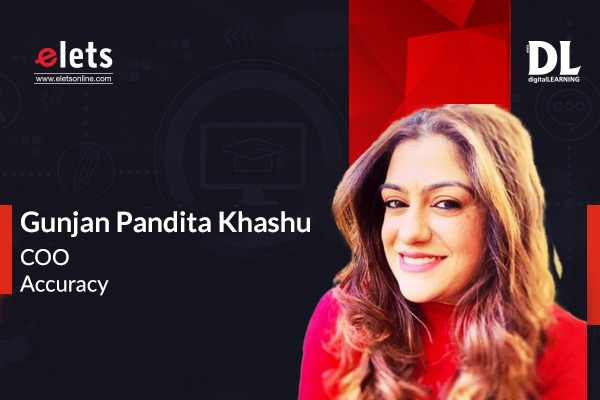
While the advent of AI tools may change the nature of some editing jobs, it is unlikely to make editors obsolete. There will still be a need for human judgment, quality assurance, personal attention, specialized expertise, and creativity in the editing process. These tools can support the editing process but definitely cannot replace human editors shared, Gunjan Pandita Khashu, COO, Accuracy in an exclusive conversation with Sheeba Chauhan of Elets News Network. Edited excerpts:
Accuracy is acing the language solutions in the most simplified ways. Explain to our readers about your varied services.
At Accuracy, we provide three primary services depending on the client’s end goal and the level of intervention required in the document:
- Proofreading: This involves checking for spelling, grammar, punctuation, and formatting errors.
- Copyediting: This involves reviewing the text for errors in grammar, syntax, and sentence structure. The editor may also suggest revisions for clarity and concision.
- Premium editing: This involves a more in-depth review of the text to ensure that the content is well organized, logically presented, and easy to follow. The editor may also suggest revisions to improve the style, tone, and voice of the writing.
With the enlarged AI market and applications like ChatGPT, do you think it can affect the services like yours in the market?
Though academic editing services and AI tools both have their unique advantages and limitations, here is why I feel these services win over AI:
- AI tools often lack the contextual understanding and expertise that human editors have, accounting for the specific field of study, academic standards, and authorial voice.
- AI tools lack the human touch and personal attention that editors can provide. They can work with authors to understand their unique writing style and goals, and provide feedback and suggestions that are tailored to their needs.
- Though AI tools can detect errors and suggest corrections, they often lack the ability to recognize more subtle writing issues, such as coherence, tone, and clarity. Academic editors can provide a more comprehensive review of a document that goes beyond simple grammar and spelling errors.
- Academic editing services involve a team of trained professionals who can provide quality assurance and ensure that the final product meets high academic standards. This includes reviewing citations, formatting, and adherence to style guidelines.
- With academic editing services, there is a level of accountability that is often lacking with AI tools. Academic editors can be held accountable for the quality of their work.
World Education Summit 2023 in Dubai aims to unlock fresh strategies and foster new approaches to build a future-ready education ecosystem. How do you think such conferences help to uplift education standards at a global level?
Such conferences can help bring together stakeholders from different backgrounds and regions to share knowledge, collaborate on solutions, and promote policies and practices that can improve education outcomes at a global level. Through this event, we look forward to having a unified platform to convey our message to our target audience.
We appraise your 100% accurate work in editing but today a lot of experienced editing professionals are fearing job loss due to the advent of AI tools. Your comments.
In line with my response above, while the advent of AI tools may change the nature of some editing jobs, it is unlikely to make editors obsolete. There will still be a need for human judgment, quality assurance, personal attention, specialized expertise, and creativity in the editing process. These tools can support the editing process but definitely cannot replace human editors.
Accuracy promises that your documents will be edited and polished to the highest quality standards. How do you manage such high standards of quality? Do you use any specific tools to maintain so?
You can have the best AI tool in the world, but it can still lead to a dissatisfied client. In contrast, we follow some key practices to ensure that we deliver nothing but the best:
- We have a very stringent process of hiring only experienced and qualified editors, who have relevant academic and professional qualifications, as well as extensive experience in editing.
- We have developed clear guidelines and processes for our editors to follow, including standards for grammar, syntax, style, formatting, and citation, and ensure that these are communicated effectively to them.
- We provide ongoing training and support to our editors to ensure that they stay up-to-date with the latest trends, techniques, and tools in academic editing.
- We continually monitor the performance of our editors to ensure that each document meets the highest quality standards. This can include having a second editor review or performing regular quality checks.
- We communicate effectively with our clients to understand their needs, provide clear feedback and suggestions, and ensure that their expectations are met.
- We continuously evaluate and improve our editing processes based on feedback from clients and editors, as well as changes in the industry. Besides editing, one of our major strengths is technology. We are working on innovative solutions that can provide a smooth research cycle to the authors.






















